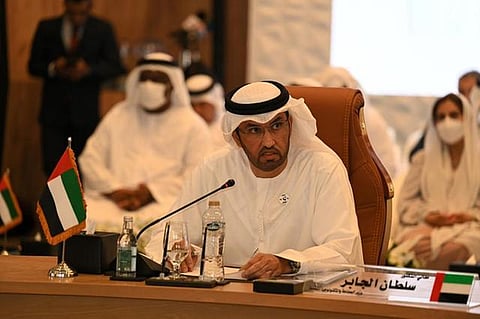Bahrain Joins Partnership for Sustainable Economic Development
The second Higher Committee meeting of the Industrial Partnership for Sustainable Economic Development has kicked off today in Cairo.
Dr. Nevin Jameh, Egypt Minister of Trade and Industry, Dr. Sultan bin Ahmed Al Jaber, UAE Minister of Industry and Advanced Technology and Yousef Al Shamali, Jordanian Minister of Industry, Trade and Supply attended the meeting.
At the meeting, the Higher Committee announced and welcomed the Kingdom of Bahrain as a new member of the Partnership represented by Zayed Al Zayani, Minister of Industry and Commerce of Bahrain.
Bahrain, a major producer of raw aluminum and iron ore, will increase the partnership's total industrial manufacturing value add from $106.26 billion to $112.5 billion.
Bahrain boasts a strong industrial sector with more than 9,500 companies and 55,000 employees and $4.3 billion in industrial Foreign Direct investments.
The Partnership aims to establish large joint industrial projects, create job opportunities, contribute to increasing economic output, diversify the economies of the partner countries, support industrial production and increase exports.
Bahrain Installs Papercast's e-Paper Passenger Information Displays
The Higher Committee Shortlisted 12 projects worth $3.4 billion to move into feasibility studies. In total, the Executive Committee received 87 industrial project proposals focused on fertilizers, agriculture and food.
In the next phase, the Partnership will focus on the metals, chemicals, plastics, textiles and clothing sectors.
Dr. Nevin Jameh, Egypt’s Minister of Trade and Industry, stressed the significance of the industrial partnership in confronting the economic consequences of the global crises and highlighted the importance of the private sector engagement in sustainable development for the Arab World.
“This partnership is key to ensuring value and supply chains, reaching industrial self-sufficiency, and creating more jobs,” she said, adding, “We welcome Bahrain to join this partnership, which will help maximize the benefit of the industrial capabilities of the four countries.”
Dr Jameh said: “To make use of this initiative, partners shall exchange science and technology expertise, set up industrial partnerships, and take advantage of the partners’ markets to promote multilateral trade.”
“Egypt’s government is very keen to do what it takes to support this partnership and pave its way so that it can achieve its targets,” she added.
Dr Al Jaber said: "We aim to leverage the partnership’s combined strengths, competitive advantages, and capabilities to help build a strong foundation for sustainable economic growth. Bahrain’s industrial sector plays a crucial role in sustainable economic development.
"This combination of government support with private sector commitment will help the partnership achieve maximum sustainable economic and social benefits.”
Zayed bin Rashid Alzayani, Bahrain’s Minister of Industry and Commerce said: "The partnership reflects a strong will to promote industrial integration between Arab countries and the world, while seeking to achieve sustainable industrial development."
In December, 2021, Bahrain launched the Industrial Sector Strategy (2022-2026), as a pivotal part of the post-pandemic economic recovery plan. The strategy aims to increase the industrial sector's contribution to GDP, increase exports, and provide jobs for citizens.
The strategy is based on adopting the Fourth Industrial Revolution, implementing the concept of a circular carbon economy along with effective environmental and social governance policies.
"The strategy encourages investment in technological infrastructure and manufacturing automation, and increasing the efficiency of supply chains to build a developed and sustainable industry," said Alzayani.
Advantages of the industrial partnership in numbers
In 2019, UAE, Egypt, Jordan, and Bahrain accounted for 30% of the Middle East and North Africa’s industrial contribution to GDP, totaling $65 billion worth of industrial exports.
The countries’ combined population is 122 million, representing 27% of the Middle East and North Africa and 49% of the region’s youth population under 24.
The value of foreign direct investment in the UAE, Egypt and Jordan reached $151 billion between 2016-2020, comprising 42% of new foreign direct investment in the Middle East.
The total value of the countries’ exports stood at $433 billion in 2019, while imports amounted to approximately $399 billion.
Read More: Bahrain Ranks Among Top 10 Performing MENA Ecosystems in GSER


